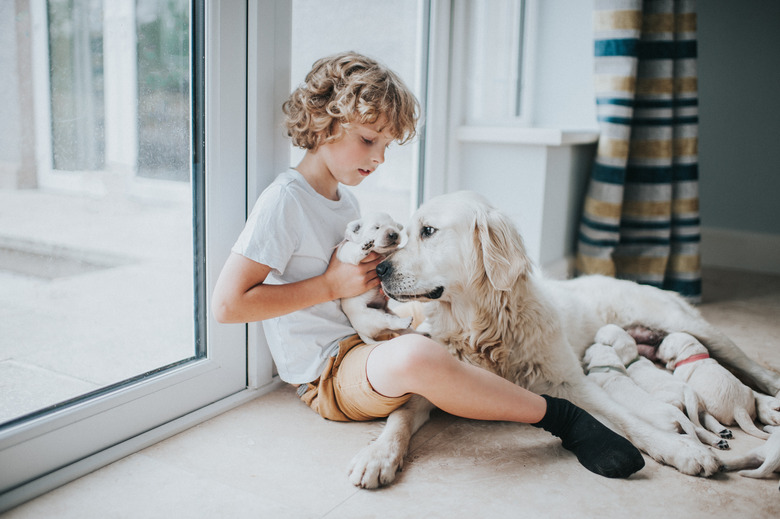How To Encourage A Mother Dog To Feed Her Puppies
In most cases, mother dogs instinctively know how to care for their puppies and begin doing so as soon as they're born. Once in a while, however, mother dogs reject some or all of their puppies, leaving the tiny creatures to fend for themselves. If your dog won't feed her newborn puppies, you may need to step in and take care of them instead. Before you take over for her, try to kick your dog's maternal instincts into gear.
A little privacy, please
A little privacy, please
Giving birth and caring for newborns are both potentially stressful occurrences. It's possible that your dog is feeling a bit overwhelmed, especially if this is her first litter. To help her calm down and ease into motherhood, try moving her whelping box to a quieter area of your home with fewer distractions.
You could also try doing the opposite. If your dog is particularly attached to you and seeks you out when she desires comfort, it's possible that her whelping box is too far away. Move it to an area where you spend a lot of time. Some dogs will be calmer and more focused on their puppies in your soothing presence.
My mother dog won't clean her puppies
My mother dog won't clean her puppies
Immediately after birth, a mother dog should lick her puppies. Doing so breaks the sack in which the puppies are born and encourages them to breathe. If your dog fails to lick her puppies when they're born, it's important for you to clean them and rub them with a towel to get them breathing.
After delivering her puppies, a mother dog will continue to lick them frequently. After birth, the licking serves to keep the puppies clean and stimulates them so they go to the bathroom as needed. If your dog refuses to lick her pups, encourage her to do so by placing a small amount of baby food or chicken puree on them. This will encourage mom to lick them and hopefully stimulate the natural drive to continue doing so.
Manually encourage nursing
Manually encourage nursing
When caring for newborn puppies, hormones and actions have a symbiotic relationship. Pregnancy hormones will encourage your dog to engage in certain behaviors, such as licking her puppies or nursing them. These activities in turn release more hormones. If your dog doesn't want to stay with her puppies or feed them, you can try gently forcing the issue to stimulate the right hormones.
To do so, lay your dog on her side to expose her nipples. Lay her puppies beside her, getting each as close to a nipple as you can. If possible, you can even help the puppies latch onto a nipple and begin to nurse. If the puppies dive into their meal, and your dog allows it, the nursing may release more hormones in your dog that inspire her to keep nursing her puppies without any help from you.
Feeling under the weather
Feeling under the weather
Sometimes, new mothers lack interest in their puppies simply because they don't feel well. It's possible for your dog to retain a placenta, fail to deliver all of her puppies, or succumb to an infection or illness during or after delivery. If so, she may feel unwell and simply not up to the task of caring for her puppies.
Immediately after the birth, contact your veterinarian if your dog has passed more puppies than placentas or if she delivered fewer puppies than you were expecting. Your dog also needs help if she continues to strain without delivering any more puppies or if she walks stiffly, has a fever, or has seizures. Continue monitoring mom's condition and call the vet if within a few days after the birth you notice your dog's nipples turning red and firm, she spikes a fever, loses her appetite, or has discharge from her nipples or vagina.
